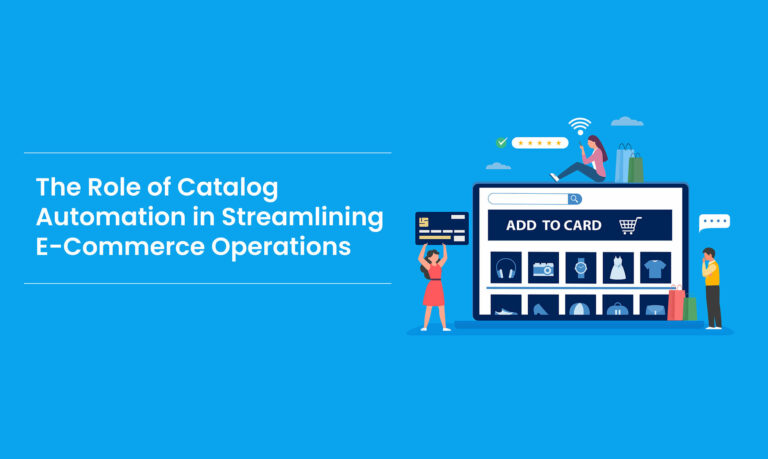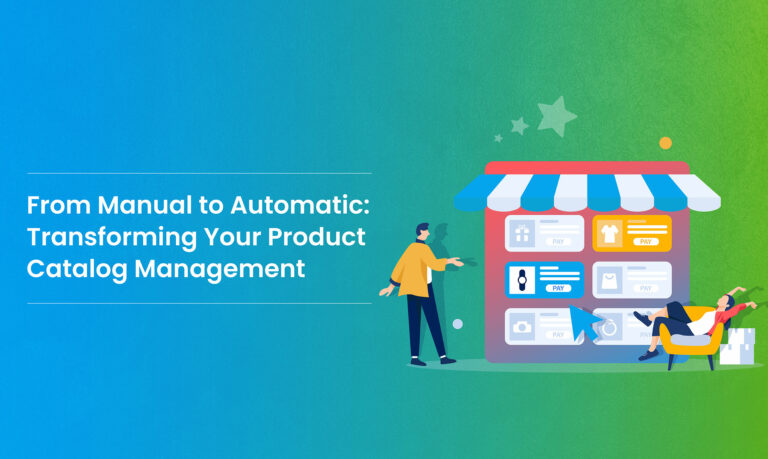Introduction
Catalogue Management Software (CMS) is your business’s organizational maestro. It simplifies the chaos of product data, allowing effortless creation, updates, and a harmonized presence across channels. In our digital age, CMS is the key to streamlined operations and a seamless customer experience.
As your business expands, managing your product catalogue becomes a more significant challenge. This is where Catalogue Management Software, such as Rubick.ai, plays a crucial role. It efficiently handles product information, offering the benefit of automated inventory management to streamline your catalogue processes.
What is Catalogue Management Software?
Catalogue Management Software (CMS) is a critical tool for organizing product data. As a centralized hub, it allows users to create, refine, and oversee important product details. With CMS, you have the authority to elegantly harmonize the entire lifespan of your product catalog, smoothly navigating from its creation to instant updates.
This tool simplifies product information management. Input details easily to create an organized catalogue and ensure accuracy and accessibility for your product lineup.
In essence, Catalogue Management Software is the key to maintaining order in the ever-evolving landscape of product data. It empowers your business to stay agile, organized, and responsive to the demands of digital commerce.
Key Features of Catalogue Management Software
Efficient Catalogue Management Software (CMS) comes equipped with a suite of features crucial for seamless operations in the digital marketplace.
Centralized Data Repository
The key to effective catalogue management is centralization. By using Catalogue Management Software (CMS), you can establish a centralized location where all your product data comes together seamlessly. This ensures that you have one reliable source of information, eliminating the confusion that comes from scattered data. With a centralized data reservoir, you can easily navigate, refine, and manage your entire product catalogue from a single location.
Product Information Standardization
In the dynamic e-commerce landscape, consistency is paramount. Enter Catalogue Management Software—an adept enforcer of uniformity in product details like names, descriptions, images, and pricing. It doesn’t just standardize; it orchestrates a professional symphony in your catalog, presenting a seamless image to your customers.
Multichannel Integration
To thrive in the digital landscape, your products need to be present across various channels. CMS facilitates seamless multichannel integration, enabling you to expand your reach effortlessly. Whether it’s your website, online marketplaces, or other platforms, CMS ensures that your product data synchronizes consistently across all channels.
User Access and Permissions
Not all users within your organization require the same level of access to your catalogue. Catalogue Management Software allows you to define user access levels and permissions. This feature ensures that different teams or individuals have access only to the relevant sections, maintaining data integrity and security.
Analytics and Reporting Capabilities
Understanding how your products perform is vital for making informed decisions. CMS provides robust analytics and reporting capabilities. You can analyze data trends, track product performance, and gain valuable insights into customer behavior. This analytical acumen not only empowers but also propels you towards crafting strategies with finesse, facilitating the optimization of your catalogue for superior outcomes.
Benefits of Implementing Catalogue Management Software
Implementing Catalogue Management Software (CMS) in your business yields a plethora of benefits, enhancing various aspects of your operations.
Improved Data Accuracy and Consistency
With CMS, wave goodbye to data discrepancies. Centralizing product information ensures consistent accuracy across all channels, eliminating worries about outdated data or damaging inconsistencies to your business reputation. Embrace CMS for seamless coherence.
Enhanced Productivity and Efficiency
Catalogue Management Software transforms the game when it comes to productivity. This smart system smoothly handles time-consuming jobs, like updating product details and managing inventory levels. It doesn’t just save you time but also makes everything work better, so you can focus on the important parts of your business.
Streamlined Multichannel Selling
Fostering business expansion across various channels is effortlessly achieved with the Content Management System (CMS). This advanced software synchronizes product data seamlessly, ensuring a consistent presentation on your website, third-party platforms, and social media for a cohesive brand experience.
Better Customer Experience
CMS contributes significantly to an enriched customer experience. By presenting accurate and consistent product information, you instill confidence in your customers. They can rely on the reliability of your catalog, leading to increased trust and satisfaction. A positive customer experience translates into repeat business and positive reviews.
Scalability for Business Growth
As your business gets bigger, so does the amount of your product info. CMS is made to be scalable, letting you easily handle a growing catalogue. Whether you’re adding new stuff, reaching into different markets, or expanding what you offer, the software adjusts to your business’s growth path.
Adopting Catalogue Management Software strategically addresses current challenges and positions your business for sustained growth. Its benefits extend beyond internal operations, impacting customer interactions and contributing to long-term success.
Challenges and Considerations in Catalogue Management
While Catalogue Management Software (CMS) offers a myriad of benefits, it’s essential to navigate through potential challenges and considerations to ensure seamless integration and utilization in your business.
Data Quality and Cleansing Issues
One of the main challenges in managing catalogues is dealing with data quality and cleaning. Keeping accurate and consistent product information requires ongoing efforts. Mistakes, duplicates, or old information can affect your operations and harm your brand reputation. Regular checks for data quality and cleaning processes are crucial to handle these challenges effectively.
Integration Challenges with Existing Systems
Blending a CMS with your current systems can be a complicated job. Issues like compatibility problems, difficulties in moving data, and the need for system changes might come up during the integration process. Thoughtful planning and a careful approach are necessary to make sure the integration goes smoothly and fits with your business’s special needs.
Cost and Resource Considerations
Implementing CMS involves costs, both in terms of software acquisition and potential adjustments to your existing infrastructure. Additionally, dedicating resources for training and ongoing maintenance is essential. Assessing the overall cost and resource implications beforehand allows you to allocate budget and manpower effectively.
User Training and Adoption
Introducing a new system, especially one as integral as CMS, requires thorough user training and seamless adoption. Reluctance to embrace change and a certain unfamiliarity with novel software may impede its optimal utilization. Allocating resources to all-encompassing training initiatives guarantees that your team adeptly navigates the system, thereby optimizing its advantages.
Security and Data Privacy Concerns
As CMS centralizes your product data, security and data privacy become paramount concerns. Protecting important product details from unauthorized access or potential breaches is crucial. Using strong security measures and following data privacy rules are essential to keep your business and customers safe.
Being mindful of these challenges and considerations in catalogue management allows you to address them proactively. By developing strategies to tackle data quality issues, ensuring seamless integration, managing costs effectively, prioritizing user training, and fortifying security measures, you position your business for successful CMS implementation and long-term operational excellence.
How to Choose the Right Catalogue Management Software
Selecting the right Catalogue Management Software (CMS) is crucial for the success of your business. Here’s a strategic guide to help you navigate the decision-making process:
1. Clarify Your Needs: Start by clearly stating what your business requires. Understand the specific features and functions you need in a CMS to reach your goals. Whether it’s managing data in one place, working with multiple channels, or having strong analytics, stating your needs sets the foundation for a focused search.
2. Scalability and Flexibility: Think about a CMS that not only meets your current needs but also grows with your business. Look for flexibility in adjusting to changing catalogue management needs and handling a growing product range.
3. Integration Abilities: Check how well the CMS can work with your existing systems. Smooth integration ensures a seamless flow of data across different platforms, avoiding disruptions in your business.
4. User-Friendly Interface: Choose a user-friendly CMS that makes navigation easy and requires minimal training for your team. A simple interface improves user adoption and makes daily operations smoother.
5. Data Security Measures: Prioritize features that keep sensitive product information safe. Make sure the CMS follows industry standards and rules, offering strong security measures to guard against possible threats.
6. Cost Considerations: Examine the cost structure of the CMS, considering both the initial purchase costs and potential ongoing expenses. Evaluate the overall return on investment (ROI) to make sure the chosen solution fits your budget.
7. Trial and Demo Opportunities: Whenever possible, use trial or demo versions of the CMS. Trying it out allows you to assess the software’s features, interface, and compatibility with your business processes before making a final decision.
By strategically approaching the selection process, you empower your business with Catalogue Management Software that not only meets your current needs but also aligns with your future growth and operational goals.
Conclusion
In summary, Catalogue Management Software (CMS) stands as the linchpin for optimizing e-commerce operations, refining data processes, augmenting efficiency, and heightening the overall customer experience. The adoption of digital catalogue solutions transcends mere trendiness; it constitutes a strategic necessity for enterprises aiming at enduring and substantial expansion.
As you navigate the dynamic landscape of eCommerce, consider leveraging innovative solutions like Rubick.ai to automate catalogue creation, improve product discovery, and gain valuable marketing intelligence. Explore how Rubick.ai can help your eCommerce business thrive.
The future of catalogue management is undoubtedly digital, and by embracing such cutting-edge solutions, you position your business for success in the ever-evolving eCommerce ecosystem. Seize the opportunity, strategize effectively, and witness your business thrive in the digital era.

